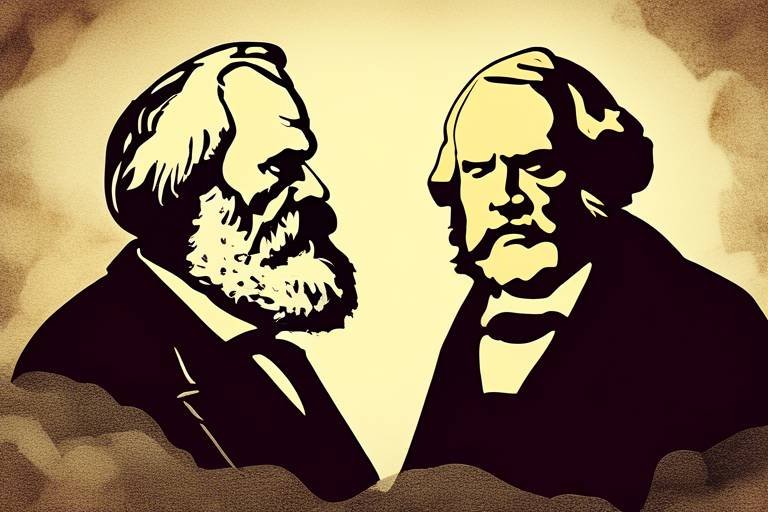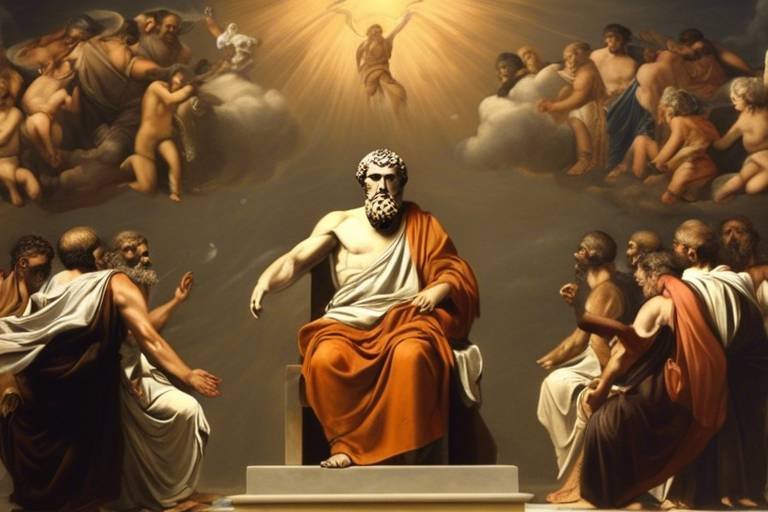The Art of Living According to Seneca
Have you ever felt overwhelmed by the chaos of modern life? The constant hustle, the never-ending distractions, and the pressure to succeed can leave us feeling lost. In moments like these, the teachings of ancient philosophers can provide a guiding light. One such philosopher, Seneca, a prominent Stoic thinker, offers profound insights into how we can navigate the complexities of life with grace and purpose. His philosophy encourages us to embrace reason, cultivate virtue, and ultimately, lead a more meaningful and fulfilling existence.
Seneca was not just an armchair philosopher; he lived through tumultuous times and faced personal challenges that tested his beliefs. His writings are rich with practical advice that resonates even today. By exploring Seneca's philosophies, we can uncover valuable lessons on happiness, resilience, and the importance of time management. Imagine being able to face life's ups and downs with a calm mind and a strong heart. Sounds appealing, right?
At the core of Seneca's teachings is the idea that true happiness is not found in external circumstances but rather within ourselves. He believed that by focusing on what we can control—our thoughts, actions, and responses—we can cultivate a sense of inner peace that remains unshaken by the chaos around us. This perspective is a breath of fresh air in a world that often equates happiness with material success or social approval.
As we delve deeper into Seneca's philosophy, we will explore how his insights can help us distinguish between fleeting pleasures and lasting contentment. We will learn about the balance between contentment and desire, the importance of self-reflection, and how to face adversity with resilience. By embracing these teachings, we can transform our lives and cultivate a sense of fulfillment that transcends the superficial.
So, are you ready to embark on this journey through Seneca's wisdom? Let’s unravel the art of living according to one of history's greatest minds, and discover how his timeless insights can help us navigate the complexities of our own lives.
- What is Stoicism? Stoicism is an ancient philosophy that teaches the development of self-control and fortitude as a means to overcome destructive emotions.
- How can Seneca's teachings apply to modern life? Seneca's insights on happiness, resilience, and time management are incredibly relevant today, offering practical strategies for leading a fulfilling life.
- What is the main message of Seneca's philosophy? The central message is that true happiness comes from within, cultivated through reason and virtue rather than external circumstances.

Understanding Stoicism
Stoicism is more than just a philosophical school; it’s a way of life that has stood the test of time, originating in ancient Greece and later flourishing in Rome. At its core, Stoicism teaches us to focus on what we can control while accepting what we cannot. Imagine standing in a storm, with winds howling and rain pouring. Instead of trying to fight the elements, Stoicism encourages you to find your center, to remain calm and composed, and to weather the storm with grace. This mindset is crucial for navigating the complexities of life, and it’s a principle that Seneca, one of the most prominent Stoic philosophers, deeply embraced.
The Stoics believed that the path to a good life is paved with **reason** and **virtue**. They taught that emotions should be managed through rational thought, and that true happiness comes from living in accordance with nature and reason. In a world that often prioritizes fleeting pleasures and material gains, Stoicism offers a refreshing perspective that emphasizes inner peace and moral integrity over external validation. It’s about cultivating a strong character and making choices that align with our values, rather than succumbing to societal pressures.
Seneca’s teachings reflect the Stoic belief that our thoughts shape our reality. By harnessing the power of reason, we can transform our perceptions and reactions to life’s challenges. This philosophical approach encourages self-discipline and resilience, allowing individuals to rise above adversity. For Seneca, the practice of Stoicism was not merely theoretical; it was a practical guide to living a fulfilling life. He often emphasized the importance of **self-control** and **wisdom**, urging us to reflect on our actions and their consequences.
The origins of Stoicism can be traced back to Zeno of Citium, who founded the school in the early 3rd century BCE. Over the centuries, Stoicism evolved, with notable figures like Seneca, Epictetus, and Marcus Aurelius contributing to its rich legacy. Each of these philosophers brought their unique insights, but they all shared a common goal: to help individuals achieve a state of tranquility and virtue.
In summary, understanding Stoicism is about embracing a philosophy that empowers us to take control of our lives through reason and virtue. It invites us to look inward, to cultivate our character, and to approach life’s challenges with a calm and composed mindset. By integrating these principles into our daily lives, we can lead a more meaningful and fulfilling existence, much like Seneca envisioned.

Seneca's Views on Happiness
When we think about happiness, it often feels like chasing a mirage in the desert—just when you think you've found it, it slips away. Seneca, the Stoic philosopher, had a unique take on happiness that can help us navigate this elusive concept. He believed that happiness isn't found in fleeting pleasures or material possessions, but rather in the consistent practice of virtue and the cultivation of inner peace. For Seneca, true happiness is a state of being that arises from living a life aligned with reason and moral integrity.
One of the pivotal distinctions Seneca made was between momentary pleasures and lasting contentment. While indulging in a delicious meal or buying the latest gadget might bring a temporary high, these experiences often fade quickly, leaving us yearning for more. In contrast, lasting happiness stems from a deep sense of fulfillment that comes from within. This inner peace is cultivated through self-discipline, wisdom, and the pursuit of virtue. Imagine happiness as a garden; it requires regular care, attention, and the right conditions to flourish.
In Seneca's eyes, the struggle between contentment and desire is a fundamental aspect of the human experience. He argued that our desires can often lead to dissatisfaction, as we continually chase after things that, once obtained, fail to satisfy us. Instead, Seneca advocated for a balanced approach, where we learn to appreciate what we have while recognizing the transient nature of our desires. By practicing moderation, we can cultivate a sense of contentment that isn't easily shaken by external circumstances.
Seneca was particularly critical of material wealth, asserting that true richness lies not in our possessions but in our character and wisdom. He famously stated, "Wealth is the slave of a wise man and the master of a fool." This highlights the idea that while material goods can provide comfort, they should never dictate our happiness or sense of self-worth. Instead of accumulating more things, Seneca encouraged us to invest in our personal growth and moral development, which ultimately leads to a more profound and lasting sense of happiness.
Another key aspect of Seneca's philosophy on happiness is the importance of self-reflection. He believed that regularly taking time to introspect and evaluate our lives can lead to greater self-awareness and understanding. By examining our thoughts, actions, and motivations, we can identify what truly brings us joy and what detracts from our happiness. This practice not only helps us align our lives with our values but also fosters a deeper connection to our inner selves. Engaging in self-reflection can be as simple as journaling or meditating, allowing us to pause and consider our paths.
Life is full of challenges, and how we respond to adversity plays a significant role in our overall happiness. Seneca taught that resilience is crucial; by facing life's difficulties with composure and strength, we can maintain our sense of peace. Instead of viewing obstacles as setbacks, he encouraged us to see them as opportunities for growth. This perspective shift can be incredibly liberating, allowing us to navigate life's storms with grace and confidence. After all, it's in the face of adversity that our true character is revealed.
In conclusion, Seneca's views on happiness offer timeless wisdom that resonates even today. By prioritizing virtue over fleeting pleasures, practicing contentment, and embracing self-reflection, we can cultivate a lasting sense of happiness that transcends the ups and downs of life. So, the next time you find yourself chasing after the next big thing, remember Seneca's insights and consider turning inward to find the true source of joy.
- What is the main idea of Seneca's philosophy on happiness?
Seneca believed that true happiness comes from virtue and inner peace, rather than material possessions or fleeting pleasures. - How can I apply Seneca's teachings to my life?
You can practice self-reflection, prioritize meaningful activities, and focus on personal growth to cultivate lasting happiness. - What role does contentment play in happiness according to Seneca?
Contentment is essential for happiness; it helps balance our desires and allows us to appreciate what we have. - How does Seneca suggest we deal with adversity?
Seneca encourages resilience and viewing challenges as opportunities for growth, which can help maintain inner peace.

Contentment vs. Desire
When we dive into the depths of Seneca's philosophy, we find a fascinating exploration of the delicate balance between contentment and desire. Imagine standing at a crossroads where one path leads to the fleeting highs of material desires, while the other guides you toward a profound sense of inner peace. Seneca urges us to choose wisely. In a world that constantly bombards us with messages about what we should want, he invites us to pause and reflect on what we truly need. Are we chasing after the latest gadget or the next big promotion, thinking they will fill the void in our lives? Or are we cultivating a sense of satisfaction with what we already have?
Seneca believed that contentment is not about complacency or settling for less; rather, it’s about recognizing the richness of our current circumstances. He famously stated, “We suffer more often in imagination than in reality.” This highlights the idea that our desires often stem from our imaginations, leading us to believe that happiness lies just out of reach, waiting for us to grasp it. Yet, in reality, true happiness is often found in appreciating the present moment, in savoring the simple joys of life.
To illustrate this balance, consider the following table that contrasts contentment and desire:
| Contentment | Desire |
|---|---|
| Focuses on what one has | Focuses on what one lacks |
| Promotes inner peace | Creates restlessness |
| Encourages gratitude | Encourages envy |
| Leads to lasting happiness | Leads to temporary satisfaction |
In essence, Seneca teaches us that moderation is key. Desire, when unchecked, can become a relentless beast, driving us to pursue endless goals without ever feeling fulfilled. On the flip side, contentment allows us to enjoy life’s journey, embracing both the highs and lows with grace. It’s about finding joy in the little things—a warm cup of coffee in the morning, the laughter of a friend, or the beauty of a sunset. These moments, though seemingly small, are the true treasures of life.
Moreover, Seneca emphasizes the importance of self-reflection in achieving this balance. He advocates for taking a step back and evaluating our desires—are they truly ours, or are they imposed by society? By understanding the root of our cravings, we can begin to disentangle ourselves from the cycle of wanting and instead cultivate a sense of appreciation for what we already possess.
Ultimately, embracing contentment over desire does not mean we should stop striving for improvement or growth. Instead, it encourages us to pursue our goals with a mindset of gratitude and awareness. When we approach life with a sense of contentment, we can pursue our desires without becoming enslaved by them, leading to a more fulfilling and meaningful existence.

Overcoming Materialism
In a world that often equates success with the accumulation of wealth and possessions, Seneca’s teachings serve as a refreshing reminder that true fulfillment lies beyond materialism. He boldly challenges the notion that happiness can be bought or measured by the things we own. Instead, he invites us to look inward, suggesting that the real treasures are found in our wisdom, virtue, and the quality of our relationships. Imagine, for a moment, a life where your happiness isn't tied to the latest gadgets or designer clothes, but instead, to the richness of your thoughts and the depth of your connections with others.
Seneca believed that the pursuit of material wealth often leads to a never-ending cycle of desire and dissatisfaction. When we chase after possessions, we can become trapped in a mindset that values quantity over quality. This constant craving can overshadow the simple joys of life, like spending time with loved ones or enjoying a peaceful moment in nature. In this way, materialism can act like a fog, clouding our vision and preventing us from seeing what truly matters. As Seneca famously stated, “Wealth is the slave of a wise man and the master of a fool.” This quote encapsulates the essence of his philosophy: it’s not about how much we have, but how we choose to use what we do have.
To overcome materialism, Seneca encourages a shift in perspective. He advocates for the practice of gratitude and contentment with what we already possess. By focusing on our internal resources—our thoughts, emotions, and values—we can cultivate a sense of richness that material goods can never provide. For instance, consider these strategies:
- Practice Minimalism: Embrace a lifestyle that prioritizes experiences over possessions. This could mean decluttering your space or choosing to invest in memories rather than things.
- Reflect on Values: Take time to identify what truly matters to you. Is it family, friendship, knowledge, or creativity? Let these values guide your decisions.
- Engage in Self-Reflection: Regularly assess your motivations and desires. Ask yourself if your pursuits align with your values or if they are merely societal expectations.
By consciously choosing to shift our focus from external validation to internal fulfillment, we can break free from the chains of materialism. Seneca’s philosophy teaches us that the path to true wealth lies in our ability to appreciate the intangible aspects of life. After all, no amount of money can replace the joy of a heartfelt conversation or the peace found in solitude. As we embrace this mindset, we not only enrich our own lives but also inspire those around us to seek a deeper, more meaningful existence.

The Role of Self-Reflection
Self-reflection is a cornerstone of Seneca's teachings, acting as a mirror that allows us to examine our thoughts, actions, and motivations. Imagine looking into a mirror, not just to check your appearance, but to delve deeper into your soul and understand who you truly are. This process is not merely an exercise in navel-gazing; it is a powerful tool for personal growth and development. Seneca believed that through self-reflection, we can gain clarity about our values, desires, and the direction we want our lives to take.
In today’s fast-paced world, we often find ourselves rushing from one task to another, barely taking a moment to pause and reflect. But what if we took a step back? What if we dedicated just a few moments each day to ponder our choices and their consequences? Seneca argued that this practice could lead to profound insights and a deeper understanding of our place in the world. By asking ourselves tough questions, such as "What truly matters to me?" or "Am I living in accordance with my values?", we can uncover layers of self-awareness that may have remained hidden.
Moreover, self-reflection helps us to recognize patterns in our behavior. For instance, if you find yourself frequently reacting with anger or frustration, taking time to reflect on these emotions can reveal underlying fears or insecurities. This awareness is the first step toward change. Instead of being a puppet to our emotions, self-reflection empowers us to take control, allowing us to respond to situations with intention rather than impulse. Seneca famously said, "We suffer more often in imagination than in reality," highlighting how our thoughts can distort our perception of life. By reflecting on our thoughts, we can separate reality from the narratives we create in our minds.
To incorporate self-reflection into your daily routine, consider the following practices:
- Journaling: Write down your thoughts and feelings at the end of each day. This can help you process your experiences and identify recurring themes.
- Mindfulness Meditation: Spend a few minutes in silence, focusing on your breath and allowing your mind to wander. Notice the thoughts that arise without judgment.
- Regular Check-Ins: Set aside time weekly or monthly to evaluate your goals and progress. Ask yourself if you are on the right path and make adjustments as needed.
In conclusion, self-reflection is not just a passive activity; it is an active engagement with our inner selves. By embracing this practice, we align ourselves with Seneca's philosophy of living a life of virtue and purpose. As we learn to understand ourselves better, we pave the way for a more meaningful existence, one that is rich in wisdom and fulfillment. So, the next time you feel overwhelmed or lost, remember to pause, reflect, and reconnect with your inner self. It may just be the key to unlocking a life of deeper satisfaction and joy.
- What is self-reflection? Self-reflection is the process of examining one's thoughts, feelings, and actions to gain insight and understanding about oneself.
- How can I practice self-reflection? You can practice self-reflection through journaling, mindfulness meditation, and regular check-ins with yourself.
- Why is self-reflection important? Self-reflection helps you understand your values, recognize patterns in your behavior, and make more intentional choices in life.
- Can self-reflection improve my mental health? Yes, self-reflection can lead to greater self-awareness, which can improve emotional regulation and overall mental well-being.

Facing Adversity
Life is a rollercoaster, isn’t it? One moment you’re soaring high, and the next, you’re plummeting into chaos. Seneca, the Stoic philosopher, recognized this tumultuous nature of life and offered profound insights on how to navigate through adversity. He believed that challenges are not merely obstacles but opportunities for growth and self-discovery. When faced with adversity, it’s essential to maintain a calm demeanor and approach the situation with a clear mind. After all, as Seneca wisely stated, “Difficulties strengthen the mind, as labor does the body.”
So, how do we cultivate resilience in the face of life's inevitable trials? First and foremost, it’s about embracing the reality of the situation. Instead of resisting or denying what’s happening, acknowledge it. This acceptance is not a sign of weakness; rather, it’s a stepping stone to finding solutions. By recognizing the circumstances, we can better analyze our options and take informed actions. In this sense, adversity can serve as a teacher, guiding us toward greater wisdom.
Another critical aspect of facing adversity, according to Seneca, is the practice of self-control. When life throws us a curveball, our emotions can run wild—anger, fear, and frustration can cloud our judgment. However, by practicing self-restraint, we can respond thoughtfully rather than react impulsively. This doesn’t mean suppressing our feelings; instead, it’s about managing them effectively. In moments of distress, take a step back, breathe, and reflect. Ask yourself, “What can I learn from this?” or “How can I turn this situation to my advantage?”
Moreover, Seneca emphasized the importance of perspective. He encouraged individuals to view their challenges in a broader context. For instance, when you’re stuck in traffic, instead of fuming about the delay, consider it an opportunity to listen to that podcast you’ve been meaning to catch up on. This shift in perspective transforms adversity into a chance for enrichment. By reframing our thoughts, we can find silver linings even in the darkest clouds.
To further illustrate Seneca’s teachings on facing adversity, let’s look at a few practical strategies:
- Practice Gratitude: In tough times, remind yourself of the things you’re thankful for. This can shift your focus from what’s going wrong to what’s going right.
- Seek Support: Don’t hesitate to reach out to friends or family. Sharing your burdens can lighten the load and provide new perspectives.
- Learn from Experience: Reflect on past adversities. What did you learn? How did you grow? This reflection can empower you to face new challenges with confidence.
In conclusion, facing adversity is an integral part of the human experience. Seneca’s teachings remind us that while we cannot control the events that occur in our lives, we can control our responses. By cultivating acceptance, self-control, and a positive perspective, we can transform challenges into opportunities for personal growth. Remember, it’s not the adversity itself that defines us, but how we choose to respond to it. So, the next time life throws you a curveball, channel your inner Stoic and face it head-on!
Q: How can I apply Seneca's teachings in my daily life?
A: Start by practicing self-reflection and embracing challenges as opportunities for growth. Incorporate gratitude and perspective shifts to help manage adversity.
Q: What is the most important lesson from Seneca about adversity?
A: The most crucial lesson is that while we cannot control external events, we can control our reactions. This control is key to resilience.
Q: How can I cultivate resilience according to Stoic philosophy?
A: Focus on acceptance, self-control, and maintaining a positive perspective. Regularly reflect on your experiences to learn and grow from them.

Time Management According to Seneca
When it comes to time management, few philosophers resonate as deeply as Seneca. This ancient Stoic thinker had a profound understanding of the fleeting nature of time, and he believed that how we manage it can significantly impact our quality of life. In a world that often feels rushed and chaotic, Seneca’s insights remind us that time is our most precious resource. He famously stated, “It is not that we have a short time to live, but that we waste a lot of it.” This perspective challenges us to reconsider how we allocate our time and what truly matters in our lives.
Seneca stressed the importance of living in the present moment, a principle that is more relevant today than ever. We often find ourselves preoccupied with what lies ahead or dwelling on the past, which can lead to a life half-lived. Instead, Seneca encourages us to embrace each moment fully, cultivating mindfulness and awareness in our daily activities. By doing so, we can transform mundane tasks into meaningful experiences. Imagine savoring your morning coffee, truly tasting its richness instead of rushing through it. This simple act can become a moment of joy rather than just another item on your to-do list.
To effectively manage time, Seneca advocated for prioritizing what truly matters. He believed that we should focus on activities that enrich our lives and align with our values. In a world filled with distractions, it’s easy to get caught up in trivial pursuits that offer little satisfaction. Seneca’s wisdom encourages us to ask ourselves: What activities genuinely contribute to my well-being? By reflecting on this question, we can create a clearer path toward a more fulfilling life. For instance, rather than scrolling through social media for hours, why not dedicate that time to reading a book or engaging in meaningful conversations with loved ones?
Another key aspect of Seneca’s approach to time management is the role of reflection. He believed that taking time to contemplate our actions and decisions is essential for personal growth. Regular self-reflection allows us to assess our progress, recognize our strengths and weaknesses, and make necessary adjustments in our lives. Consider setting aside a few moments each day to reflect on your experiences. You might find it helpful to keep a journal where you can jot down your thoughts and feelings. This practice not only enhances self-awareness but also fosters a deeper understanding of what truly matters to you.
In summary, Seneca's teachings on time management are not just about efficiency; they're about living a life of purpose and meaning. By embracing the present, prioritizing what matters, and engaging in self-reflection, we can reclaim our time and make the most of our lives. As we navigate through the complexities of modern existence, let us remember Seneca’s wisdom and strive to manage our time with intention and clarity.
- What is the main takeaway from Seneca's philosophy on time management?
Seneca emphasizes the importance of living in the present and prioritizing meaningful activities over trivial pursuits. - How can I apply Seneca's teachings in my daily life?
By practicing mindfulness, engaging in self-reflection, and focusing on what enriches your life, you can align your actions with your values. - Why is self-reflection important according to Seneca?
Self-reflection helps us assess our progress, understand our motivations, and make informed decisions that lead to personal growth.

Prioritizing What Matters
In our fast-paced world, where distractions are as abundant as grains of sand on a beach, prioritizing what truly matters can feel like searching for a needle in a haystack. Seneca, the Stoic philosopher, offers us a guiding light through this chaos. He emphasizes that life is fleeting, and each moment is a precious commodity. So, how do we ensure we’re spending our time on the right things? It’s all about understanding our values and aligning our actions accordingly.
Seneca teaches us that we often get caught up in the trivial pursuits of life, chasing after things that ultimately do not contribute to our happiness or fulfillment. He suggests that we take a step back and evaluate our priorities. This might mean asking ourselves some tough questions: Are we investing our time in relationships that nurture us? Are we dedicating ourselves to work that brings us joy? Or are we merely going through the motions, ticking boxes without any real engagement?
One effective way to prioritize what matters is to create a personal values list. This list can serve as a compass, guiding you through daily decisions. Here’s a simple approach to crafting your own:
- Identify Core Values: Reflect on what truly matters to you—be it family, health, creativity, or community.
- Rank Your Values: Once you have a list, rank them. Which ones do you hold most dear? This helps clarify your focus.
- Set Goals: For each value, set specific, actionable goals. This keeps you accountable and ensures you’re making progress.
By prioritizing based on your values, you can better allocate your time and energy. Instead of getting swept away by the tide of daily demands, you become the captain of your own ship, steering towards your chosen destination. This not only enhances your productivity but also enriches your life experience. Imagine waking up each day knowing that your actions are aligned with your deepest beliefs—that’s a game-changer!
Moreover, Seneca's philosophy suggests that we should regularly reflect on how we spend our time. This means taking a moment at the end of each day to ask ourselves: Did I spend my time wisely? Did I focus on what matters? This practice of reflection not only helps us recognize patterns in our behavior but also allows us to make necessary adjustments. It’s a bit like tuning a musical instrument; regular checks ensure that we remain in harmony with our values.
In conclusion, prioritizing what matters is not just about making a list; it’s about cultivating a mindset that values reflection, intentionality, and alignment with our core beliefs. By embracing Seneca's teachings, we can navigate through life's noise and focus on what truly enriches our existence. Remember, it's not the quantity of time we have, but the quality of how we use it that leads to a fulfilling life.
1. How can I identify what truly matters to me?
Take some time for self-reflection. Consider what brings you joy, fulfillment, and a sense of purpose. Writing these down can help clarify your thoughts.
2. What if my priorities change over time?
That’s completely natural! Life is dynamic, and so are our values. Regularly revisiting your priorities allows you to adapt and grow.
3. How can I ensure I stick to my priorities?
Setting specific goals related to your values and regularly reflecting on your progress can help keep you accountable and focused.
4. Is it okay to say no to things that don’t align with my priorities?
Absolutely! Saying no is a powerful tool that allows you to protect your time and energy for what truly matters.

The Importance of Reflection
Reflection is not just a casual pastime; it’s a powerful tool that can transform our lives in profound ways. Seneca, the Stoic philosopher, held reflection in high regard, viewing it as essential for personal growth and self-awareness. But why is this practice so crucial? Imagine your life as a ship navigating through the vast ocean. Without reflection, you might drift aimlessly, but with it, you can chart a course that leads you to your desired destination. Reflection allows us to pause, look back, and assess our journey, ensuring that we’re not just moving, but moving with purpose.
In Seneca's view, taking time to reflect helps us to understand our motivations, desires, and actions. It’s like holding up a mirror to our souls, allowing us to see not just our external actions, but the internal drivers behind them. This self-examination can lead to greater clarity about what truly matters in our lives. As we reflect, we can ask ourselves questions such as: What have I learned from my experiences? or Am I living in alignment with my values? These inquiries can illuminate paths toward improvement and fulfillment.
Moreover, reflection fosters resilience. Life is filled with challenges and setbacks, and without reflection, we might repeat the same mistakes over and over. By contemplating our failures and successes, we gain insights that can guide our future decisions. This process is akin to a scientist analyzing data; each experience, whether good or bad, becomes a piece of evidence that contributes to our understanding of ourselves and the world around us.
Seneca also emphasized the importance of setting aside time for this practice. He believed that regular reflection can help us prioritize our actions and align them with our goals. It’s not just about looking back; it’s about using those insights to inform our present and future choices. In today’s fast-paced world, where distractions are abundant, carving out time for reflection can feel like a luxury. However, it’s essential to recognize that this time is an investment in our well-being and personal growth.
To make the most of reflection, consider creating a structured approach. Here’s a simple framework inspired by Seneca’s teachings:
- Daily Journaling: Set aside a few minutes each day to write about your thoughts, feelings, and experiences. This practice can help clarify your mind and reveal patterns in your behavior.
- Weekly Reviews: At the end of each week, take time to review what you’ve learned. What went well? What could be improved? This will help you stay focused on your goals.
- Monthly Goals: Reflect on your long-term objectives. Are your daily actions leading you toward them? Adjust your course as necessary.
In conclusion, the importance of reflection in our lives cannot be overstated. It’s a vital practice that not only enhances our understanding of ourselves but also empowers us to lead more meaningful and intentional lives. By embracing reflection, we can navigate the complexities of life with greater wisdom and clarity, ultimately becoming the architects of our own destinies.
- Why is reflection important? Reflection helps us understand our actions and motivations, leading to personal growth and better decision-making.
- How often should I reflect? Regular reflection, such as daily journaling or weekly reviews, is beneficial for maintaining focus and alignment with your goals.
- Can reflection help with stress management? Yes, taking time to reflect can provide clarity and reduce anxiety by helping you process your thoughts and feelings.
Frequently Asked Questions
- What is Stoicism and how does it relate to Seneca?
Stoicism is an ancient Greek philosophy that teaches the development of self-control and fortitude as a means to overcome destructive emotions. Seneca, being one of the prominent Stoic philosophers, emphasized the importance of reason, virtue, and inner peace in achieving a fulfilling life. His teachings guide us to navigate life's challenges with resilience and wisdom.
- How did Seneca define happiness?
Seneca believed that true happiness is not found in fleeting pleasures, but rather in lasting contentment that comes from virtue and inner peace. He argued that happiness is a state of mind cultivated through self-reflection and understanding, rather than through external possessions or superficial desires.
- What does Seneca say about contentment and desire?
Seneca taught that finding a balance between contentment and desire is crucial for a fulfilling life. He suggested that moderation in our pursuits can lead to greater satisfaction, urging us to appreciate what we have rather than constantly yearning for more.
- How does Seneca view material wealth?
Seneca critiqued the obsession with material wealth, asserting that true wealth lies in wisdom and virtue. He believed that relying on external possessions for happiness only leads to emptiness, and that cultivating inner richness is far more rewarding.
- Why is self-reflection important in Seneca's philosophy?
Self-reflection is a cornerstone of Seneca's teachings. He emphasized that regularly contemplating our actions and motives can lead to personal growth and a deeper understanding of ourselves. This introspection helps us make better choices and align our lives with our values.
- How can we face adversity according to Seneca?
Seneca's insights on resilience encourage us to maintain our composure in the face of life's challenges. He advised that by embracing difficulties as opportunities for growth, we can develop a stronger character and a more profound sense of inner peace.
- What are Seneca's views on time management?
Seneca regarded time as our most valuable resource, urging us to prioritize meaningful activities over trivial pursuits. He believed that living in the present moment and making conscious choices about how we spend our time leads to a more enriched and fulfilling life.
- How does reflection contribute to better decision-making?
In Seneca's philosophy, reflection is essential for personal development. By taking the time to contemplate our actions and their consequences, we can learn from our experiences and make more informed decisions that align with our goals and values.


















